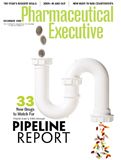Animal Humanity
Pharmaceutical Executive
The new EU directive looks to reduce, refine, and eventually replace animal testing
The European Union is currently revising its rules governing animal testing, but industry is not entirely happy with the proposed new Directive. The current Directive, which has been in force since 1986, was designed to harmonize the rules for animal testing across the whole EU. However, some member states have implemented more stringent standards, while others stick to the bare minimum.

Sarah Houlton
The revised Directive aims to address this discrepancy, and ensure that companies engaging in animal testing face the same rules EU-wide. After eight years of discussion, the proposal has now been adopted by the European Commission. In coming months it will be discussed and voted on by the European Parliament and the EU Council; a final decision is likely to be made late next year.
The New Directive
Every year, about 12 million animals are used in scientific procedures within the EU. While 90 percent of R&D for medicines does not use lab animals, there are still some areas where animal research is essential. However, the Registration, Evaluation and Authorization of Chemicals legislation that is currently being implemented expands the requirements for chemicals to be tested before they are allowed on the EU market. This almost certainly will lead to a rise in the number of animal tests carried out in coming years.
The proposed Directive covering these tests includes several new measures, such as a near-total ban on experiments on great apes, including chimpanzees. (This fits the current regime, as great apes have not been used in the EU for six years.) Work with monkeys will still be permitted. Meanwhile, breeding, accommodation, and care standards for all animals will have to be improved.
"It is absolutely important to steer away from testing on animals," says European environment commissioner Stavros Dimas. "But where alternatives are not available, the situation of animals used in experiments must be improved."
One positive aspect is that the work pharma had achieved in the replacement, reduction, and refinement of animals in testing is being enshrined in the new Directive. Replacement involves using procedures that don't involve live, sentient animals; reduction seeks to minimize the number of animal experiments carried out; and refinement entails methods that minimize the amount of distress an animal suffers.
Good for Animals and Patients
While parts of the Directive simply formalize the rules that industry has been working under for some time, there are serious concerns with some of the proposed revisions. These include a perception that it will impose unnecessary regulatory burdens on scientists, and do little if anything to improve animal welfare. Another concern is that the Directive will encourage research to be done outside the EU, in countries where animal-testing rules are less stringent.
The UK BioIndustry Association is disappointed with some of the new proposals. "One would expect that the proposed Directive would take into account the most up-to-date scientific and ethical practices. However, this does not seem to be the case," claims UK BioIndustry's chief executive, Aisling Burnand.
The Association of Medical Research Charities is also concerned that policymakers do not necessarily understand the complexities of achieving the right balance of what is and is not allowed. "While animals must never be used where there are alternatives, aiming for blanket reductions in numbers may be an overly simplistic approach that enables our sector to be seen to act, while [remaining] incompatible with progress in medical research," says head of external relations, Sophie Petit-Zeman. "This Directive needs to proceed in ways that are good for animals and patients."
Animal welfare groups generally welcome the proposals, according to the European Coalition to End Animal Experiments (ECEAE). However, they want assurance that the sentiments are not just abstract, and that there will be increased investment in alternative research and binding targets on the reduction of animal use. "We applaud the Commission for taking this opportunity to address the suffering caused to animals," says ECEAE Chief Executive Michelle Thew. "We must not lose this chance to ensure that the final law delivers mandatory targets for the rapid reduction of animal use by member states."
Sarah Houlton is Pharmaceutical Executive's global correspondent. She can be reached at sarah@owlmedia.co.uk
Merck’s Oral TLR7/8 Inhibitor Reduces Disease Activity in Cutaneous, Systemic Lupus
May 21st 2025Results from the Phase II WILLOW trial show that enpatoran achieved a statistically significant dose-response and clinically meaningful reduction in disease activity in cutaneous and systemic lupus erythematosus with active rash.
Addressing Disparities in Psoriasis Trials: Takeda's Strategies for Inclusivity in Clinical Research
April 14th 2025LaShell Robinson, Head of Global Feasibility and Trial Equity at Takeda, speaks about the company's strategies to engage patients in underrepresented populations in its phase III psoriasis trials.
Beyond the Prescription: Pharma's Role in Digital Health Conversations
April 1st 2025Join us for an insightful conversation with Jennifer Harakal, Head of Regulatory Affairs at Canopy Life Sciences, as we unpack the evolving intersection of social media and healthcare decisions. Discover how pharmaceutical companies can navigate regulatory challenges while meaningfully engaging with consumers in digital spaces. Jennifer shares expert strategies for responsible marketing, working with influencers, and creating educational content that bridges the gap between patients and healthcare providers. A must-listen for pharma marketers looking to build trust and compliance in today's social media landscape.
